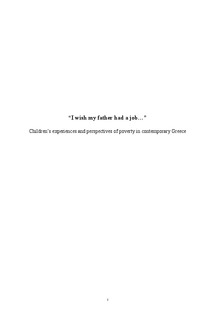| dc.description.abstract | While Europe is slowly emerging from a devastating financial crisis, in Greece the ordeal is far from being over. Every-day life is frustrating and tough, and the economic figures do not capture the hardship of the austerity-hit economy. In amidst the challenging realities of poverty, unemployment, indebtedness, markets’ stagnation and austerity measures children’s lives are suffering tremendous and deep impacts. The government programs in education, health, and child protection were amongst the first to be cut due to budget constraints. Furthermore, the financial crisis is intensifying the effects of the increasing cost of the daily life, seriously challenging the abilities of families to cope and of children to thrive.
This study aimed to explore children’s experiences and perspectives of poverty in the urban area of Athens, the capital of Greece. Fourteen children, whose one or both parents have lost their jobs, participated and they helped me generate rich and valuable data. Parents, teachers and social workers were also interviewed and contributed with their knowledge to a more diverse and broad understanding of child and familial poverty. The major theoretical perspectives on which this study was based are the Structural perspective of the new Social Studies of Childhood, political economy as well as discourses on agency, resilience, neoliberalism, poverty and social reproduction. This theoretical background constituted an excellent base to build my study upon, pointing out that children are deeply affected by political, economic and societal macro-parameters stemming from the financial crisis and neoliberalism practices. Children, although they are capable social actors, they cannot escape the macro-parametric impacts that extrude them and their families in poverty. Yet, poverty is multifaceted and goes beyond monetary aspects, therefore children’s perspectives are very illuminating.
The children in this study are excellent political and economic commentators. Not only they realize that the financial crisis is part of a “global picture” but they also link it with parental unemployment and the consequent economic problems they face in their households. Children exercise their agency in order to get by, to get out and, what I propose, to “get on with life” under poverty. They do not consider themselves poor. Instead, they use other expressions that indicate financial constriction. Children’s views on poverty go beyond material deprivation and they include lack of quality-time spent with the parents, inability of going on vacations or on family nights-out, self-exclusion practices and constrains on their dreams for the future. Another aspect of poverty that emerged from the narratives of children is the “parent poverty” which has to do with the physical and emotional absence of the parent. Children endure a harsh, everyday reality and they do so in silence in order not to over-burden their parents. Disrupted social reproduction has led them in shouldering more domestic and caretaking responsibilities. Since there are not many similar studies done in Greece, I consider it very important to let the children’s voices to be heard and illuminate their realities | nb_NO |
